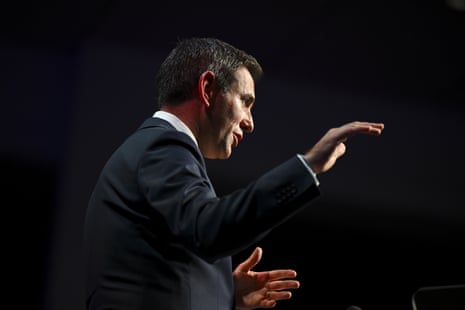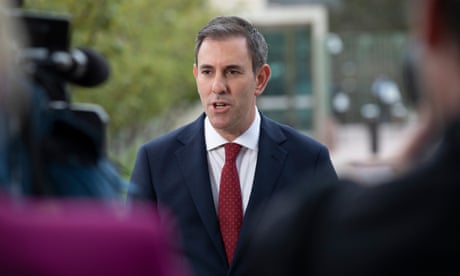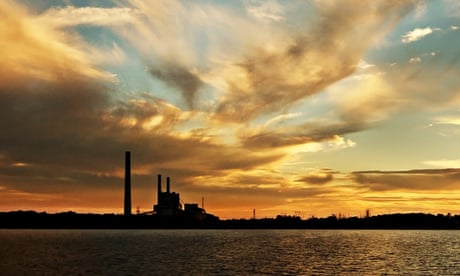ACCC to review gas industry as Labor’s budget forecasts point to a 56% rise in power prices over the next two years.
- Explore all of our 2022 Australia federal budget coverage
- Get our morning and afternoon news emails, free app or daily news podcast

Wed 26 Oct 2022 19.11 AEDT
Last modified on Wed 26 Oct 2022 21.22 AEDTThe Australian Competition and Consumer Commission confirmed it had new riding instructions from the government after the treasurer, Jim Chalmers, on Wednesday flagged fresh government intervention in the energy market.
The ACCC review follows new budget forecasts pointing to a 56% increase in retail electricity prices over the next two years and a smaller but still significant spike in gas prices. The ACCC has been asked to look at the voluntary code of conduct that governs supply agreements between gas producers and customers to “ensure reasonable pricing” and to improve transparency.
Australia’s gas industry believes the government is considering making the code mandatory as well as extending the powers of the Australian Energy Market Operator (Aemo) to govern market behaviour. With a regulatory intervention in prospect, gas producers are lobbying the government to ensure any review and ultimate policy shift takes in the whole sector, including pipeline operators.
Guardian Australia understands senior ministers are working with the ACCC and the Australian Energy Regulator as well as departmental officials on options for a substantial regulatory intervention. While the focus so far has been on gas, with the Australian Workers Union championing price controls, the government is also looking at the electricity sector.
The ongoing deliberations in Canberra come as both the Victorian and South Australian governments have flagged taking back more government control in the energy sector. The Andrews government has announced it will revive the publicly owned State Electricity Commission.
The South Australian premier, Peter Malinauskas, on Wednesday signalled he was also examining all options. Chalmers noted on Wednesday in his traditional post-budget address that much of the regulatory power rested with the states.
As new figures released on Wednesday showed inflation had surged to a 32-year high of 7.3%, largely driven by energy costs, Chalmers said the government had yet to determine its “preferred path” for intervention, but was working up options.
Sign up for our free morning newsletter and afternoon email to get your daily news roundup
While not ruling out future direct financial support to households to “take some of the sting” out of rising energy costs, Chalmers said he was more inclined to further regulate in both the electricity and gas sectors.
He flagged an expanded role for the ACCC, saying he wanted to “involve them more in the solution” than had occurred in the past. The ACCC confirmed on Wednesday the government had extended its gas inquiry role through to 2030.
Chalmers said high gas prices were “smashing industry” and left open the possibility of supporting a gas price trigger that would divert supply to the domestic market, which had been a key demand of the Australian Workers’ Union.
For retail electricity prices, which were estimated to increase 56% over the next two years, Chalmers emphasised that cash payments risked hurting struggling families more by further driving up inflation, which was “the dragon we need to slay”.
“I believe that more effective than sending people cheques to deal with it in the near term, that a better avenue for us to explore is on the regulatory side and beyond that I don’t want to limit our options,” he said at the traditional post-budget address at the National Press Club on Wednesday.
“In terms of the type of mechanism – triggers, caps, other kinds of regulation – I’m not prepared to pre-empt any of that or narrow down the conversation today. It does involve multiple levels of government, it does involve multiple ministers, and so I’d rather leave our options pretty open.”
Chalmers said that any changes would require a “lot of consultation” with colleagues and said the states would need to be involved.
“Given the prime minister often references his bachelor of economics degree, can he advise the house how it is possible to have prices rise by more than 50% but fall by $275 at the same time?” the deputy leader, Sussan Ley, asked.
The prime minister, Anthony Albanese, criticised the former government for its 22 separate energy policies over the past decade that it had been unable to deliver, and said the fact that renewable energy provided cheaper energy had been “beyond the capacity of those opposite to recognise.”


No comments:
Post a Comment